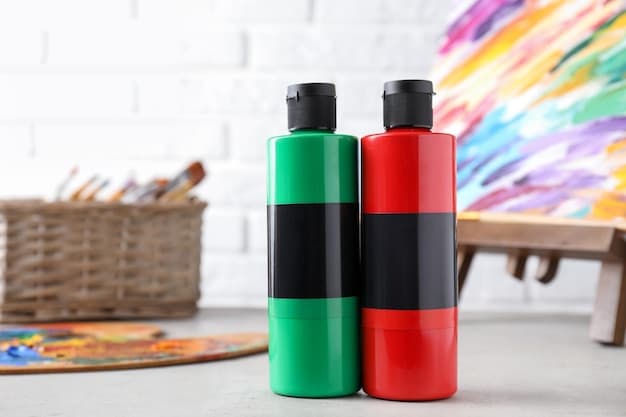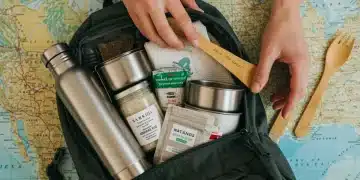Reduce Your Plastic Footprint: 7 Simple Travel Swaps for 2025

Looking to reduce your environmental impact while exploring the US? Discover seven simple and effective plastic swaps you can make in 2025 to minimize your footprint and travel more sustainably, from reusable water bottles to eco-friendly toiletries.
Planning a trip across the US and want to be more eco-conscious? It’s easier than you think to reduce your plastic footprint while traveling the US: 7 Simple Swaps for 2025 can make a significant difference. Let’s explore some practical changes you can make to protect our planet while enjoying your adventures.
Why Reduce Plastic Use While Traveling?
Traveling can be an amazing experience, but it often contributes to plastic waste. From single-use water bottles to disposable toiletries, the accumulation of plastic can have a devastating impact on the environment. Reducing plastic use while traveling is not only responsible but also essential. It helps to preserve the natural beauty of the destinations we visit and contributes to a healthier planet for future generations.
The impact of plastic pollution is far-reaching, affecting wildlife, ecosystems, and even our own health. By making conscious choices to minimize our plastic consumption, we can actively participate in creating a more sustainable travel experience. This includes opting for reusable alternatives, supporting local businesses committed to eco-friendly practices, and educating ourselves about the best ways to reduce waste.

1. Reusable Water Bottles and Hydration Solutions
One of the simplest and most effective ways to reduce plastic waste while traveling is by bringing a reusable water bottle. Plastic water bottles are a major source of pollution, and opting for a refillable one can significantly decrease your environmental impact. Not only is it good for the planet, but it can also save you money in the long run.
In addition to reusable bottles, consider other hydration solutions such as water filters or purification tablets. These can be particularly useful in areas where the water quality is uncertain. Staying hydrated is essential for your health while traveling, and these alternatives ensure you can do so sustainably. Investing in a durable, high-quality reusable water bottle is a small change that makes a big difference.
Choosing the Right Reusable Water Bottle
When selecting a reusable water bottle, consider factors like material, size, and durability. Stainless steel and glass bottles are excellent options as they are free from harmful chemicals and can withstand the rigors of travel. Choose a size that is convenient to carry and that meets your daily hydration needs.
Water Filters and Purification Tablets
For travelers venturing into areas with questionable water sources, water filters and purification tablets are a must. These tools can eliminate bacteria, viruses, and other contaminants, ensuring you have access to safe drinking water. Look for portable and lightweight options that are easy to pack.
- Carry a reusable water bottle to avoid single-use plastics.
- Use water filters or purification tablets for safe drinking water.
- Refill your bottle whenever possible at water fountains or refill stations.
- Opt for stainless steel or glass bottles for durability and safety.
By making these simple hydration swaps, you can substantially reduce your plastic waste and contribute to a more sustainable travel experience. Staying hydrated without harming the environment is a win-win situation.
2. Eco-Friendly Toiletries and Personal Care Products
Traditional travel-sized toiletries are often packaged in single-use plastic containers, contributing to unnecessary waste. Swapping to eco-friendly alternatives is a great way to reduce your plastic footprint. Consider investing in reusable travel containers and filling them with your favorite eco-friendly shampoos, conditioners, and soaps.
Another option is to purchase solid toiletries, such as shampoo bars, conditioner bars, and solid toothpaste. These products come with minimal packaging and are just as effective as their liquid counterparts. They are also travel-friendly, as they don’t count towards liquid restrictions in carry-on luggage. By making these simple changes, you can maintain your personal care routine without harming the environment.
Reusable Travel Containers
Reusable travel containers are a game-changer for eco-conscious travelers. These containers allow you to bring your own preferred toiletries without relying on single-use plastic bottles. Look for sets that are leak-proof and made from durable materials.
Solid Toiletries: Shampoo Bars and More
Solid toiletries are compact, lightweight, and minimize packaging waste. Shampoo bars, conditioner bars, and solid toothpaste offer a sustainable alternative to liquid products. Plus, they often last longer, making them a cost-effective choice.
- Invest in reusable travel containers for your toiletries.
- Switch to solid toiletries like shampoo and conditioner bars.
- Choose products with minimal or biodegradable packaging.
- Support brands committed to sustainable and ethical practices.
Eco-friendly toiletries and personal care products are readily available, making it easier than ever to travel responsibly. Making these swaps not only reduces plastic waste but also supports companies that prioritize sustainability.
3. Reusable Shopping Bags and Produce Sacks
When traveling, it’s common to do some shopping, whether for souvenirs, groceries, or other essentials. Instead of relying on plastic shopping bags, bring your own reusable bags. They are lightweight, easy to pack, and can be used for a variety of purposes. Plus, many stores now offer discounts or incentives for customers who bring their own bags.
For produce, consider using reusable produce sacks instead of the thin plastic bags provided in supermarkets. These sacks are made from breathable fabric and can be washed and reused multiple times. They are perfect for carrying fruits, vegetables, and other items purchased at local markets. By adopting these simple habits, you can significantly reduce your reliance on single-use plastics while traveling.
The Benefits of Reusable Shopping Bags
Reusable shopping bags are not only eco-friendly but also durable and versatile. They come in various sizes and materials, so you can find one that suits your needs. Look for bags that can be easily folded and stored in your backpack or suitcase.
Reusable Produce Sacks for Sustainable Shopping
Reusable produce sacks are a practical alternative to plastic bags for carrying fruits and vegetables. They allow your produce to breathe, which can help extend its freshness. Choose sacks made from organic cotton or other sustainable materials.

- Carry reusable shopping bags for groceries and souvenirs.
- Use reusable produce sacks for fruits and vegetables.
- Decline plastic bags at stores and markets.
- Choose durable and easy-to-store reusable options.
Reusable shopping bags and produce sacks are simple yet effective tools for reducing plastic waste while traveling. Incorporating these habits into your routine can make a significant positive impact on the environment.
4. Ditch Single-Use Utensils and Straws
Single-use utensils and straws are ubiquitous in the travel industry, but they contribute significantly to plastic pollution. Carrying your own reusable utensils and straws is a simple way to avoid this waste. A set of bamboo or stainless steel utensils is lightweight, easy to clean, and can be used in a variety of situations.
Reusable straws are also a great alternative to plastic straws, which often end up in oceans and waterways. Many restaurants and cafes are now offering paper straws or encouraging customers to go straw-free, but having your own reusable straw ensures you’re always prepared. By making these small swaps, you can enjoy your meals and drinks without contributing to plastic waste.
Reusable Utensil Sets: A Traveler’s Essential
A reusable utensil set typically includes a fork, spoon, knife, and chopsticks. These sets are often made from bamboo, stainless steel, or other durable materials. Look for a set that comes with a carrying case for easy storage and transportation.
The Benefits of Reusable Straws
Reusable straws are an eco-friendly alternative to plastic straws. They come in various materials, including stainless steel, bamboo, and silicone. Choose a straw that is easy to clean and durable enough to withstand regular use.
- Carry a reusable utensil set to avoid single-use plastics.
- Use a reusable straw for drinks at restaurants and cafes.
- Politely decline single-use utensils and straws when offered.
- Choose utensils and straws made from sustainable materials.
Ditching single-use utensils and straws is a small change that can have a big impact. By carrying your own reusable alternatives, you can reduce your plastic footprint and promote more sustainable practices.
5. Say No to Single-Use Plastic Packaging
Many products, especially food items, come wrapped in single-use plastic packaging. While it may not always be possible to avoid plastic packaging entirely, there are steps you can take to minimize your reliance on it. One option is to buy in bulk and repackage items in reusable containers. This can be particularly useful for snacks, nuts, and other travel essentials.
Another strategy is to choose products with minimal packaging or packaging made from sustainable materials. Look for items wrapped in paper, cardboard, or biodegradable materials. By being mindful of your purchasing choices, you can reduce the amount of single-use plastic that ends up in landfills and oceans.
Buying in Bulk and Repackaging
Buying in bulk is a great way to reduce plastic packaging. Purchase items like nuts, dried fruit, or granola in larger quantities and repackage them into reusable containers for travel. This not only reduces waste but can also save you money.
Choosing Products with Minimal Packaging
When shopping for travel essentials, opt for products with minimal packaging. Look for items wrapped in paper, cardboard, or other sustainable materials. Support brands that are committed to reducing their packaging waste.
- Buy in bulk and repackage items in reusable containers.
- Choose products with minimal or sustainable packaging.
- Avoid individually wrapped items whenever possible.
- Support brands that prioritize eco-friendly packaging.
Saying no to single-use plastic packaging is a conscious choice that can significantly reduce your environmental impact. By being mindful of your purchases and opting for sustainable alternatives, you can contribute to a more eco-friendly travel experience.
6. Support Local Businesses with Sustainable Practices
When traveling, supporting local businesses is a great way to immerse yourself in the culture and contribute to the local economy. However, it’s also important to choose businesses that are committed to sustainable practices. Look for restaurants that source their ingredients locally, hotels that have implemented eco-friendly initiatives, and shops that sell ethically made products.
By supporting these businesses, you are not only reducing your own environmental impact but also encouraging other businesses to adopt more sustainable practices. Ask questions about their sustainability efforts and let them know that you appreciate their commitment to the environment. Your choices as a traveler can make a difference in promoting more responsible tourism.
Identifying Sustainable Businesses
Look for businesses that have certifications or labels indicating their commitment to sustainability. Examples include LEED certification for buildings and Fair Trade certification for products. Read online reviews to see what other customers have to say about their sustainability practices.
Engaging with Local Communities
Participate in activities that support local communities and promote sustainable tourism. This could include taking a guided tour led by local residents, attending a cultural event, or volunteering for a local environmental organization.
- Support local businesses with sustainable practices.
- Look for certifications and labels indicating sustainability.
- Engage with local communities and participate in eco-friendly activities.
- Ask questions about their sustainability efforts and offer positive feedback.
Supporting local businesses with sustainable practices is a win-win situation. You get to experience the local culture and contribute to the local economy while also promoting environmental responsibility.
7. Packing a Zero-Waste Travel Kit
One of the best ways to ensure you’re prepared to reduce plastic waste while traveling is to pack a zero-waste travel kit. This kit should include all the essentials you need to minimize your environmental impact, such as a reusable water bottle, utensils, shopping bags, and toiletries.
In addition to these basics, consider adding other items like beeswax food wraps, reusable snack bags, and a bamboo toothbrush. Having these items on hand will make it easier to avoid single-use plastics and make more sustainable choices throughout your journey. A well-stocked zero-waste travel kit is your best defense against unnecessary plastic waste.
Essential Items for a Zero-Waste Travel Kit
Include a reusable water bottle, utensil set, shopping bags, produce sacks, and eco-friendly toiletries in your zero-waste travel kit. These items will cover most of your basic needs and help you avoid single-use plastics.
Additional Items for Comprehensive Waste Reduction
Consider adding beeswax food wraps, reusable snack bags, a bamboo toothbrush, and a reusable coffee cup to your kit. These items will further reduce your environmental impact and ensure you’re prepared for any situation.
- Pack a zero-waste travel kit with essential items.
- Include additional items for comprehensive waste reduction.
- Organize your kit for easy access and use.
- Refill and replenish your kit as needed throughout your trip.
Packing a zero-waste travel kit is a proactive step towards reducing your plastic footprint. By being prepared with the right tools, you can enjoy your travels while minimizing your impact on the environment.
| Key Swap | Brief Description |
|---|---|
| 💧 Reusable Bottles | Avoid single-use plastic water bottles by carrying a refillable one. |
| 🧴 Solid Toiletries | Opt for shampoo bars and other solid toiletries to reduce plastic packaging. |
| 🛍️ Reusable Bags | Bring reusable shopping and produce bags to avoid plastic bags. |
| 🍴 Reusable Utensils | Carry your own utensils and straw to avoid single-use plastics. |
FAQ: Reducing Plastic While Traveling
Reducing plastic use during travel helps minimize environmental impact, preserving natural beauty and supporting sustainable tourism. Single-use plastics contribute to pollution, harming wildlife and ecosystems.
Eco-friendly alternatives include solid shampoo bars, conditioner bars, and reusable travel containers. These options reduce plastic waste and are convenient for travel.
Bring reusable shopping bags and produce sacks, buy in bulk and repackage items, and choose products with minimal or sustainable packaging to avoid single-use plastics.
A zero-waste travel kit should include a reusable water bottle, utensils, shopping bags, and eco-friendly toiletries to minimize environmental impact during your travels.
Look for local businesses with certifications indicating their commitment to sustainability, engage with local communities, and ask questions about their sustainability efforts to support responsible tourism.
Conclusion
Reducing your plastic footprint while traveling the US in 2025 is achievable with these seven simple swaps. By adopting these sustainable practices, you’re not only making a positive impact on the environment but also enriching your travel experiences. Every small change contributes to a greater cause, ensuring that future generations can enjoy the beauty of our planet.





